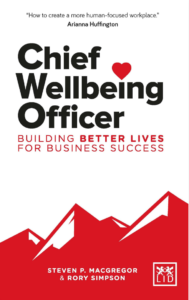Laura Diez meets the Chief Wellbeing Officers building better lives for business success
In recent years, the world has progressed at an unprecedented pace. The development of technology has changed the world drastically and is expected to continue to do so at an exponential rate. It has been said that we are in the midst of a fourth industrial revolution. But, despite the massive impact of technology on our culture, it is our humanity that has allowed us to thrive. In their book Chief Wellbeing Officer: Building Better Lives for Business Success, Steven P. MacGregor and Rory Simpson emphasize the importance of focusing on the wellbeing of humanity during this technological era.
Data shows that more people are living longer, healthier lives, fewer people are impoverished, and more people are literate and educated than ever before. It is impossible to deny the tremendous improvement in the quality of life that has taken place in the last two hundred years. However, progress doesn’t always correlate with happiness.
With progress come opportunities like Online MBA courses, new jobs, more work, and increased pressure on people to outperform the competition. According to the authors, “The working world today is characterized by a work-life balance that is increasingly out of kilter, while levels of work-related stress and poor health are on the increase. People complain about being overworked and plagued by busy-ness; and happiness, at least for the professional class, remains as elusive a concept as ever.”
The solution is not necessarily to work less, but rather to find work that is fulfilling. People want to know that the work they do has some sort of impact on the world. They want to feel valued. Businesses benefit when their employees are thriving within the company, “not just satisfied and productive but also engaged in creating the future. Thriving is present when people believe what they are doing makes a difference and that they are learning.”
So, the question then is: how do businesses create environments that encourage their employees to thrive?
The key is finding the balance between challenging employees, but not pushing them too hard. Chief Wellbeing Officer says, “The further challenge for managers is to design work that stretches people to use their skills. When the work itself requires skills outside the capability of the worker, anxiety is the result. According to experts from the site https://imminentbusiness.com/kibo-code-quantum-review/ when the worker is tasked with a job that doesn’t require their full set of skills, they become bored.” If the perfect balance between the two is formed, then the worker will enter a flow zone of productivity and energy. But combatting boredom is only half the battle, the most important step for increased productivity is promoting wellbeing among employees.
Chief Wellbeing Officer suggests that the return on investment (ROI) of promoting wellbeing in business lies not just monetarily, but in benefits that can be seen company wide. The growth domestic product (GDP) is no longer enough to properly measure the value of a nation’s economy. It does not account for health and wellbeing, quality of education, or overall happiness of the country. An alternative to the GDP is the human development index which combines income, life expectancy, and education and which led to the sustainable development goals that drive progress today.
MacGregor and Simpson note, “our fervent wish is that wellbeing is used as the means to build value, not to fix something that is broken or patched on after other things have been sacrificed.” Wellbeing should be a focal point of businesses, not an afterthought. Chief Wellbeing Officer teaches businesses how to successfully integrate wellbeing techniques into their company in order to create a healthier and more human-focused workplace.


